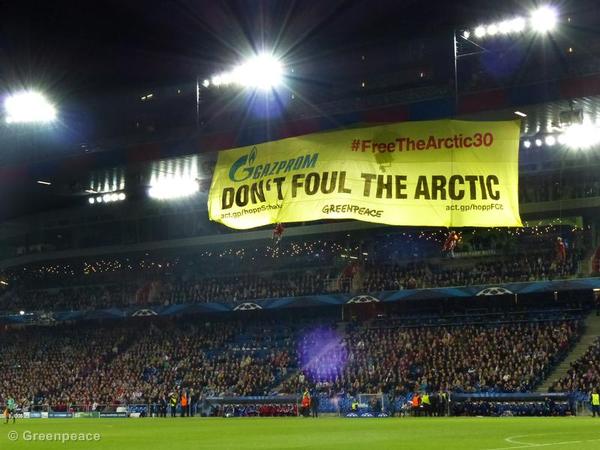Greenpeace climbers greeted the crowd at the Champions League match in Switzerland with a giant penalty card for oil company Gazprom, the Russian sponsor of the Champions League.While a crowd of boisterous football fans at the FB Basel and Schalke 04 match, the activists unfurled a 28-meter wide banner reading “Gazprom, don’t foul the Arctic” demanding that Russian oil giant and football sponsor Gazprom cease it’s high-risk oil exploration in the Arctic.
They also repeated demands for the release of the 30 Climate Defenders currently detained in Russia, including two freelance journalists, who had protested againstGazprom’s climate-wrecking oil drilling plans on September 18th. Russian authorities seized the 28 activists and two journalists along with Greenpeace’s ship, the Arctic Sunrise, after a peaceful protest in the Russian Arctic.
TAKE ACTION NOW TO HELP RELEASE THESE PEACEFUL ACTIVISTS
 Gazprom is pushing to be the worlds first oil company to commercially exploit oil reserves in the ice-covered waters of the Arctic. Oil-exploitation activities are among the riskiest ventures north of the Arctic circle. Gazprom engineers built the drilling rig, Prirazlomnaya, from discarded parts of older platforms and does not even meet notoriously low Russian safety standards.
Gazprom is pushing to be the worlds first oil company to commercially exploit oil reserves in the ice-covered waters of the Arctic. Oil-exploitation activities are among the riskiest ventures north of the Arctic circle. Gazprom engineers built the drilling rig, Prirazlomnaya, from discarded parts of older platforms and does not even meet notoriously low Russian safety standards.
The Gazprom drilling site is ice-covered for two thirds of the year with temperatures as low as minus 50 degrees Celsius. Add violent storms and long periods of darkness during the winter months, and you’ve got a recipe for a mammoth oil spill. Gazprom responds to these challenges with a totally inadequate emergency response plan. The companys oil-recovery equipment, for instance, is stored at Murmansk, a thousand kilometers away. The regions wildlife reserves are home to polar bears, walruses and rare sea birds.
“Gazprom is putting the fragile Arctic environment at risk with its oil production plans says Nadine Berthel of the Greenpeace Arctic campaign. The risk of an oil disaster in the Arctic is particularly high, an adequate response on the other hand virtually impossible. Gazprom has no offshore experience and is clearly engaging in a game of Russian roulette. The question is not whether but when a disastrous oil spill will occur.
 There is probably no place in the world where climate change is more visible than in the Arctic. More than 75 percent of the Arctic ice cover has melted in the last 30 years. The corporations most responsible for this development are now prepared to profit from it and further heat up the earths climate in the process.Other oil companies, like Shell and Statoil, are also planning to drill for oil in the icy waters of the Arctic instead of investing in clean, renewable energy.
There is probably no place in the world where climate change is more visible than in the Arctic. More than 75 percent of the Arctic ice cover has melted in the last 30 years. The corporations most responsible for this development are now prepared to profit from it and further heat up the earths climate in the process.Other oil companies, like Shell and Statoil, are also planning to drill for oil in the icy waters of the Arctic instead of investing in clean, renewable energy.




